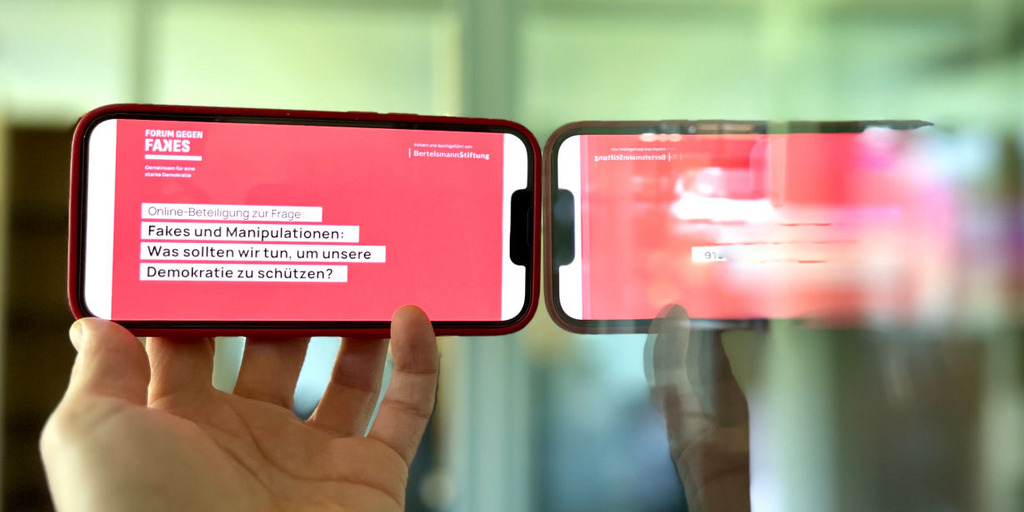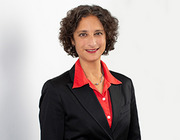Today, the “Forum against Fakes: Together for a strong democracy”, initiated by Bertelsmann Stiftung, published its report on the results of Germany’s largest online participation to date: 197,835 citizens submitted and evaluated 1,611 proposals. From 24. January to 1. April 2024, the German population was invited to contribute its proposals via an online platform and vote on the ideas submitted. The results clearly illustrate that disinformation is perceived as a real threat to democratic order and is taken very seriously by the public. There is one surprising result: The risk posed by the influence of foreign states on our information landscape, particularly in the run-up to elections, is rarely mentioned.

© Stefan Roch/Bertelsmann Stiftung
The whole of Germany has a say: Recommendations for dealing with disinformation
The Bertelsmann Stiftung project “Forum against Fakes: Together for a stron democracy" has sparked a broad debate about dealing with disinformation. In spring, the project invited citizens to take part in its online participation – and about 200,000 people have already contributed to the debate and submitted 1,611 concrete proposals on how to proceed against fake news. Here are the results of the debate.
Content
Measures to combat disinformation
In their comments, many citizens emphasise the close correlation between disinformation and mistrust in the democratic system. They point out that fakes are a threat not only to individuals, but also to society and democracy in general.
The participants’ proposals clearly demonstrate where their priorities lie when it comes to dealing with disinformation: In the field of “Education and awareness” (26 per cent), “Strengthening of media literacy and critical thinking” was recommended, for example. The section “Media practice” (24 per cent) included, for example, the demand for more “Transparency of media structures” or a clear “Distinction between facts and editorial opinions when reporting”. “Education on social network mechanisms” and a “consistent tracing and prosecution of fake news", as well as greater willingness to assume responsibility was assigned to the “Role of social networks” (24 per cent). There is a broad consensus of opinion that the assumption of “responsibility” by all involved or affected parties (private individuals, policymakers, but also the media and platform operators) is absolutely vital. However, some participants are also in favour of restrictive measures, such as political and regulatory steps to combat disinformation.
Most people in the country know that disinformation is a new challenge to our democracy, but it is also wrong to spread panic. We must learn to deal with it. The citizens’ proposals and ideas show how we can succeed.
Dominik Hierlemann, expert for citizen participation, Bertelsmann Stiftung
Start of the second phase
The results of the online participation are currently being discussed and processed in a Citizens’ Panel, a diverse group of 120 citizens selected at random.
The work of the Citizens’ Panel will culminate in the formulation of concrete recommendations for policymaker action, which will be summarised in a Citizens’ Report. This will be presented to the Federal Ministry of the Interior and Community on 12. September 2024, followed by a discussion with federal and regional politicians, platform operators, and representatives of the media and civil society organisations. The Federal Government will use the results of the Citizens’ Report as a basis for drawing up its strategy for dealing with disinformation.
Materials
Additional Information:
The project “Forum against Fakes – Together for a Strong Democracy” is run by the Bertelsmann Stiftung in cooperation with the Federal Ministry of the Interior and Community (BMI), Stiftung Mercator and the Michael Otto Foundation for Sustainability. In addition, the project is supported by the t-online news portal, the initiatives #UseTheNews and “Deutschland Sicher im Netz e.V.” and the project advisory board.
It combines broad online participation with a diverse citizens' assembly in an innovative way. Since the first meeting in Berlin on 15 March, 120 citizens representing society’s diversity have been intensively exchanging ideas with each other as well as with experts from science and practice.





